What is business resilience?
Published on April 17, 2024
Last updated on July 18, 2024
Jump to a section
During any trying economic period, such as the COVID-19 pandemic or the 2008 financial crisis, countless businesses fail. Still, many survived. What helps them protect and maintain business operations? So often, it's preparation, business continuity planning and resilience.
If you think you would struggle to give an off-the-cuff, in-depth explanation of how your organisation would respond to unexpected disruptions, you're more likely to struggle when disruptions happen. Your business is not yet resilient, and it's essential to make business resiliency part of your company culture to thrive, or at least survive, in any circumstances.
But how can you build resilience? First, you need to understand the nuances between business resilience, business continuity, and disaster recovery.
Business Resilience, Continuity, and Disaster Recovery
Let's start by clearing up some confusion about what resilience means. Traditionally, companies would have disaster management and crisis management strategies in place, but modern businesses now understand that many existential threats are more subtle than earthquakes or stock market crashes.
For this reason, your strategies need to be just as nuanced. Here's what each term means.
What is business resilience?
Business resilience refers to an organisation's ability to adapt to disruptions while maintaining continuous business operations and safeguarding people, assets, and overall brand equity.
Business resilience involves anticipating potential threats and having processes ready to handle unexpected events. This goal is to ensure the business can still thrive despite challenges. That said, company resilience encompasses not just recovery strategies, but proactive measures to prevent crises and minimise their impact.
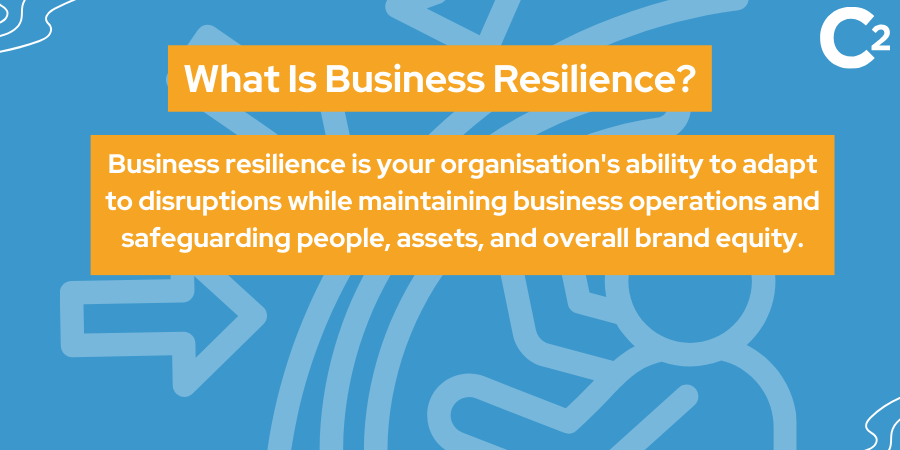
What is business continuity?
Business continuity is the planned approach by which organisations ensure that critical operations can continue during and after a significant disruption.
It's about having systems in place to reduce downtime and minimise losses during incidents such as natural disasters, cyberattacks, or technical failures. The goal is to maintain essential functions operational and to ensure the stability of services and the supply chain.
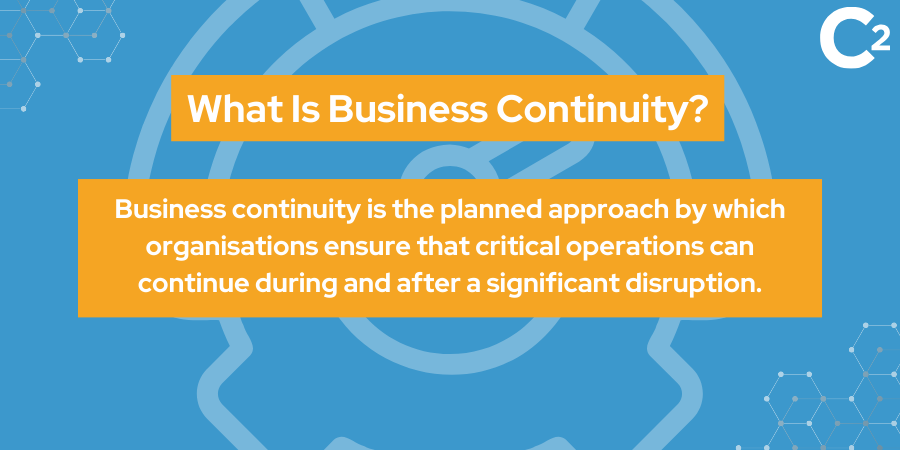
What is disaster recovery?
Disaster recovery specifically focuses on the recovery aspect of resilience after a disaster strikes. It is a subset of business continuity, detailing the steps an organisation takes to quickly resume critical functions following disruptions. This can include, but is not limited to, restoring IT infrastructure and accessing data from backup systems to regain functionality of essential software, applications, and hardware.
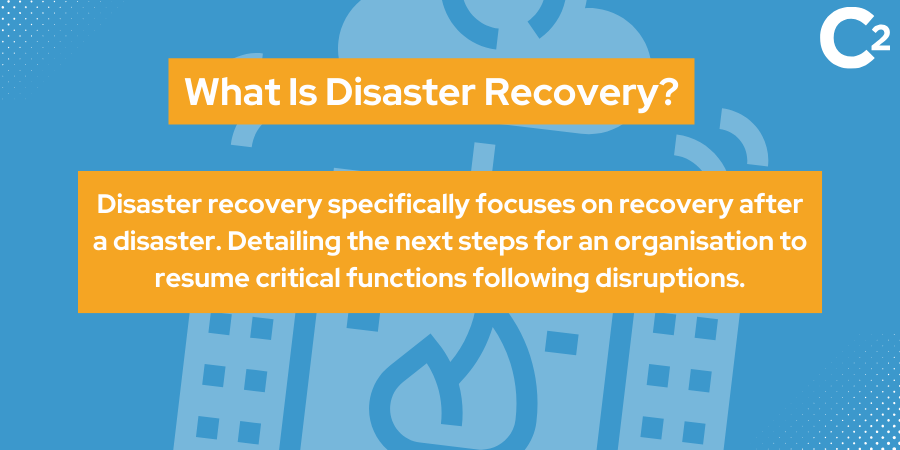
Business Resilience vs Business Continuity
Business continuity ensures essential functions persist during disruptions, minimising downtime. Business resilience planning, however, adopts a broader strategy to not only maintain but adapt and thrive amidst challenges. It involves proactive risk management and flexible business models to capitalise on environmental changes, providing a comprehensive approach to sustain operations under any circumstances.
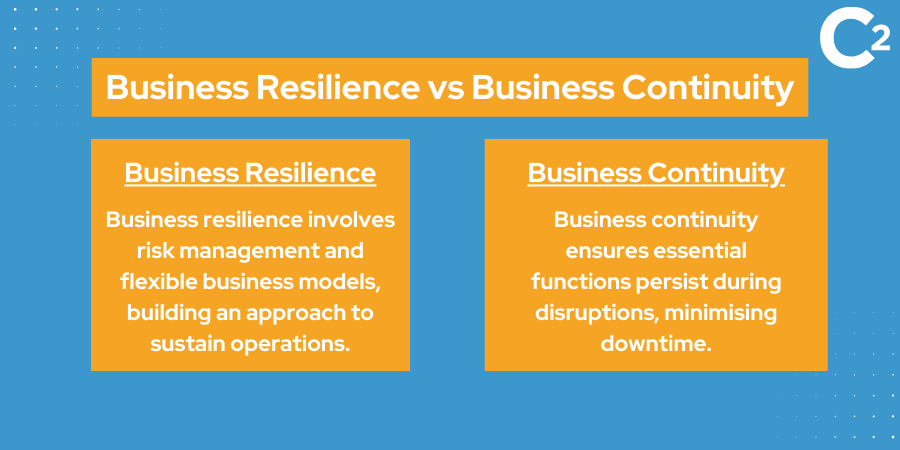
Why is business resilience important?
Running a business comes with its set of risks. From cyber-attacks to natural disasters, disruptions are often inevitable and can lead to significant financial losses or reputational damage if not managed proactively. A company's ability to handle these incidents is what makes or breaks its business operations.
Business resilience is then not just about your ability to maintain operations but also about performing at your desired level despite circumstances, or at least within your acceptable predefined levels before the crisis. This involves a comprehensive approach to risk management that includes preparing for, responding to, and recovering from disruptions, while also adopting proactive measures to mitigate these risks where possible.
For example, a sudden disruption might force your organisation to change some processes due to limited access to supply and raw materials. But the real challenge lies in ensuring that you can still meet customers' expectations when it comes to product quality.
Types of business resilience
There are different types of business resilience to ensure your company maintains its business resilience standards in the face of different threats.
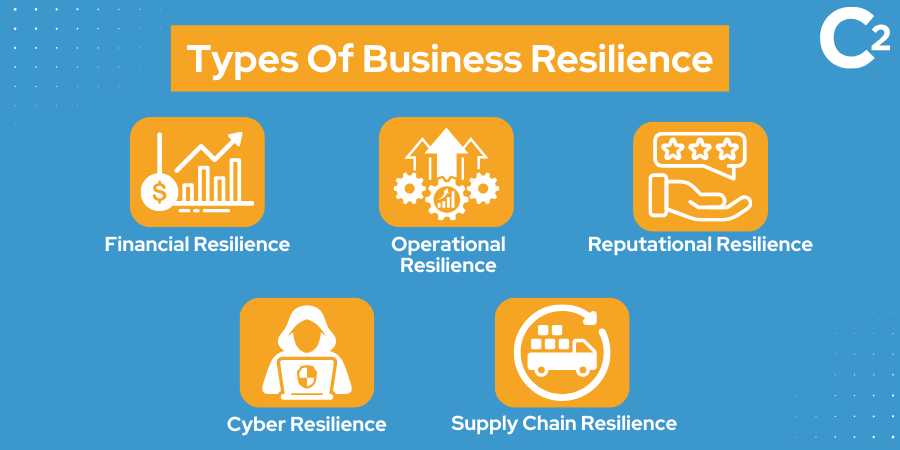
Financial resilience
Financial resilience refers to an organisation's ability to withstand various economic challenges, such as a recession, financial loss, and market volatility. A financially resilient company can maintain a healthy cash flow and diversity in its revenue stream as well as reduce debt levels.
Businesses can achieve financial resilience through prudent financial management strategies and effective cost-control measures. These efforts enable you to withstand any uncertainties in the market and support the business financially under any circumstances.
Operational resilience
Operational resilience refers to the company's ability to ensure critical business functions and operations, regardless of external threats and market conditions. It involves robust planning, risk management, and integrated implementation of a business resilience strategy to maintain critical business systems and processes.
These companies maintain clear communication channels and effective coordination to ensure operational continuity. They properly designate tasks to employees to ensure that every aspect of the organisation and business operation is running smoothly, maintaining the trust of customers and the confidence of stakeholders.
Reputational resilience
Reputational resilience demonstrates a company's ability to recover from situations or events that could lead to reputational damage. These companies achieve that through a well-thought-out branding strategy and crisis communications that enable them to maintain a positive company image. They also achieve reputational resilience through supply chain transparency with customers, maintaining ethical practices, and proactive communication.
The effective management of potentially leading to reputational damage reassures customer satisfaction and a commitment to resolve mistakes. Aside from retaining your existing customers, reputational resilience also helps to win over new business.
Cyber resilience
Cyber resilience, also known as data resilience, refers to improving technology infrastructure designed to detect, prevent, respond to, and recover from cyber attacks or incidents. Nowadays, the risk of cyber threats is high. In fact, 32% of businesses reported that they had been the target of breaches or attacks in 2023. This underscores how crucial it is to implement a robust cybersecurity plan and protocol.
Your cybersecurity strategy must include encryptions, firewalls, and other cybersecurity practices. Employee training is also integral to maintaining cyber resilience, especially when using company software and hardware systems. Plus, cyber resilient companies have a contingency plan to help faster recovery from cyber attacks and threats.
Supply chain resilience
Supply chain management is critical to maintaining business operations for most organisations. Your ability to support supply chain resilience avoids disruptions limiting your access to raw materials and services vital to your business processes.
Ensuring supply chain transparency, maintaining a good relationship with suppliers, and having a backup plan can mitigate potential supply chain disruptions. Consider diversifying your supply chain to maintain operations and services, and, ultimately, deliver goods to your customers.
How to build business resilience?
Risk management allows you to take a proactive approach and get an overview of the impact various threats could have on your organisation.
You can achieve business resilience by conducting wide-reaching risk assessments for every conceivable problem. While it's impossible to exhaustively "future-proof" your business, you can make your business more resilient by prioritising the most likely problems and ensuring you have a response plan ready.
Here's what to do.
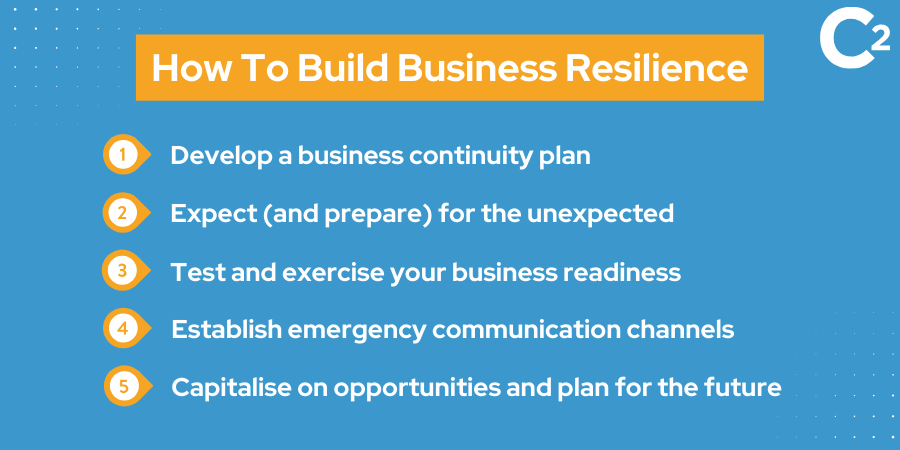
Develop a business continuity plan
Without a business continuity plan, the company will grind to a standstill in disruptive events. Business continuity management systems need to be activated as soon as certain conditions are met. For example, if productivity drops below a certain level or a key supplier goes out of business.
A timely response is critical. A well-designed plan is useless if it comes into effect a month too late. The plan should also be accessible to the management team during emergencies so it can be put into effect and coordinated promptly.
Expect (and prepare for) the unexpected
There's precious little time in the day-to-day running of a business to sit down and think, "What would we do if a sinkhole opened up in front of the office?" – right?
Disasters happen, and you don't want your business to be caught unprepared and to have to operate at a fraction of your usual productivity for weeks because of an accident that you should have been able to identify and prepare for. It's worth putting a day or two aside for business leaders, management staff, and resilience professionals to work on contingency plans that will help the business operate as usual if the worst should happen.
Test and exercise
You may wish to test how your business would respond to a few of the most likely disruptions. This can be as simple as organising a work-from-home day for staff when, for example, train strikes or planned engineering works are announced in advance.
While many companies have already experienced WFH or remote work arrangements amid the pandemic, it's worth remembering how difficult it was to adjust to such arrangements, and, worse, how many companies failed as a result.
Establish emergency communication channels
Crisis communication is vital to continuity and disaster planning. You need to establish:
- Which members of the management and/or communication teams need to liaise with each other?
- Which channels that aren't connected to the organisation's digital infrastructure can they communicate? If you experience a cyber-attack, company accounts and even devices may be inaccessible.
- Who is responsible for communicating with team members and deploying the continuity plan?
- Who is responsible for contacting emergency services such as the police, cybersecurity experts, software providers, building managers, etc.?
- How can you contact clients and customers if company accounts are inaccessible?
Resilience relies on every part of the company to understand what their roles are and work together. This simply can't happen without clear communication.
Opportunity planning
Circumstances that will affect the company's long-term prospects can be managed to an extent. However, if a core product becomes redundant or there's a terminal hit to demand, resilience also means being able to identify new growth opportunities.
New opportunities should utilise the organisation's current strengths and expertise. This will ensure a smoother transition and should mean that most staff can be retained if the company's direction shifts.
A resilient business will have identified several potential growth opportunities well before disaster strikes. Panicked decision-making only takes the organisation in one direction: down.
Consider BCMS for your business resilience
The simplest and most effective way to create a comprehensive business continuity plan is to use bespoke business continuity management software. Here's why.
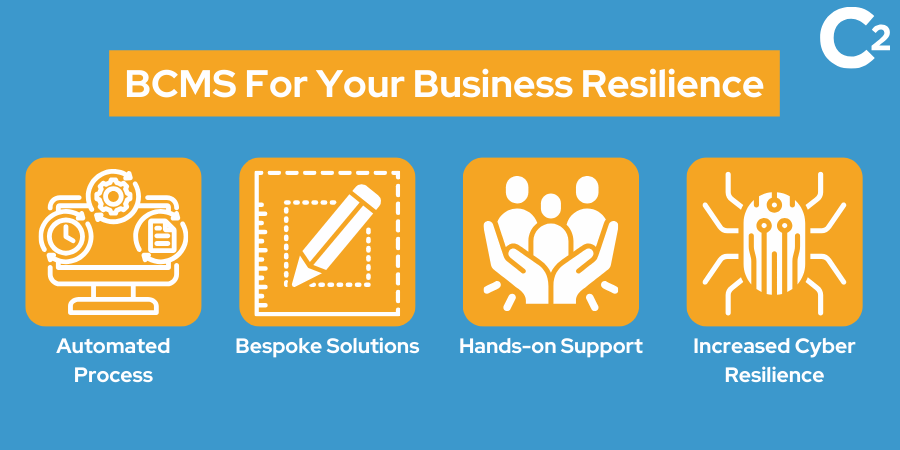
Automated processes
Easily identify gaps in workflows and plan countermeasures by automating your continuity processes. The chain is only as strong as its weakest link – resilience software allows you to identify where your company will struggle in adverse circumstances and adjust accordingly.
Bespoke solutions
Every business has different needs and must develop a unique response to disasters, economic downturns, and other problems. There's no one-size-fits-all solution.
Professionally managed resilience software lets you create a continuity plan that recognises your company's position, potential outcomes, and how different events will affect you. It's far more intuitive than relying on a general template.
Hands-on support
Reliable, consistent communication from your resilience software provider makes it so much easier to put continuity strategies into practice with minimal disruption to your organisation. Choose a software provider who has your back when you need it most.
Increased cyber resilience
Cyber threats like ransomware and phishing can cripple operations, breach data security, and erode customer trust, leading to significant financial and reputational damage. Continuity2's BCMS offers advanced, automated threat detection and risk assessments, empowering your business to preemptively address vulnerabilities and maintain operational continuity. Stay ahead of cyber threats with strategic, real-time defenses.
Moving forward...
Does your business have a tailor-made continuity and disaster management strategy? If not, it's time to develop one.
C2 Meridian is at the cutting edge of operational resilience. Automate and improve your company's business continuity processes and workflows and ensure that if the worst should happen, you're best prepared.
Written by Aimee Quinn
Resilience Manager at Continuity2
With an Honours degree in Risk Management from Glasgow Caledonian University and 6+ years in Business Risk and Resilience, Aimee looks after the design and implementation of Business Continuity Management Systems (BCMS) across all clients. From carrying out successful software deployments to achieving ISO 22301, Aimee helps make companies more resilient and their lives easier in the long run.


Written by Aimee Quinn
Resilience Manager at Continuity2
With an Honours degree in Risk Management from Glasgow Caledonian University and 6+ years in Business Risk and Resilience, Aimee looks after the design and implementation of Business Continuity Management Systems (BCMS) across all clients. From carrying out successful software deployments to achieving ISO 22301, Aimee helps make companies more resilient and their lives easier in the long run.